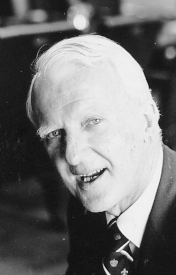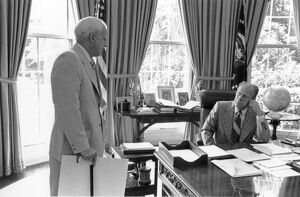Difference between revisions of "Philip Buchen"
(Created page with "{{person |WP=https://en.wikipedia.org/wiki/Philip_W._Buchen |constitutes=lawyer |interests= }} {{SMWDocs}} ==References== {{reflist}} {{Stub}}") |
m (Text replacement - "who served as" to "who was") |
||
| (4 intermediate revisions by 3 users not shown) | |||
| Line 1: | Line 1: | ||
{{person | {{person | ||
| − | |||
|constitutes=lawyer | |constitutes=lawyer | ||
|interests= | |interests= | ||
| + | |image=Philip Buchen (1974-08-15 A0147 NLGRF) 2.jpg | ||
| + | |wikipedia=https://en.wikipedia.org/wiki/Philip_W._Buchen | ||
| + | |description=Buchen, a longtime friend and law partner of [[Gerald Ford]], delivered an influential memo written by a Nixon aide that strongly argued for clemency for in [[Watergate scandal]]. | ||
| + | |alma_mater=University of Michigan (Ann Arbor) | ||
| + | |birth_date=February 27, 1916 | ||
| + | |birth_place=Sheboygan, Wisconsin, U.S. | ||
| + | |death_date=May 21, 2001 | ||
| + | |death_place=Washington DC, U.S. | ||
| + | |political_parties=Republican | ||
| + | |employment={{job | ||
| + | |title=White House Counsel | ||
| + | |start=September 1975 | ||
| + | |end=January 20, 1977 | ||
}} | }} | ||
| + | }} | ||
| + | '''Philip William Buchen''' was an American attorney who was [[White House Counsel]] during the [[Ford Administration]]. | ||
| + | |||
| + | ==Early life== | ||
| + | Buchen was born in [[Sheboygan, Wisconsin]], the son of State Senator [[Gustave Buchen]].<ref>https://www.washingtonpost.com/archive/local/2001/05/23/philip-buchen-dies/28f9ee1f-9931-490d-9fcd-8cb9673fefb9/ </ref> In his youth he contracted [[polio]] and thereafter walked with a cane. He graduated from Sheboygan High School in 1935 and received his [[Juris Doctor|J.D.]] degree in 1941 from the [[University of Michigan]], where he met [[Gerald Ford]]. At Michigan, he was a member of [[Delta Kappa Epsilon]] Fraternity. | ||
| + | |||
| + | ==Career== | ||
| + | He opened a law practice in [[Grand Rapids, Michigan]] with Ford in May 1941. | ||
| + | [[File:President Ford with Philip Buchen, Counsel to the President, in the Oval Office A5298-8.jpg|thumb|left|Buchen with President Ford in 1975]] | ||
| + | |||
| + | Buchen continued to practice law in Grand Rapids until 1974, when he came to Washington to serve on Vice President Ford's staff. Buchen, a longtime friend and law partner of Ford's, was a trusted aide on his vice presidential staff who began organizing for a transition of power when it was becoming clearer that Nixon could be forced to resign the presidency because of the [[Watergate scandal]].<ref name=WP>https://www.washingtonpost.com/archive/local/2001/05/23/philip-buchen-dies/28f9ee1f-9931-490d-9fcd-8cb9673fefb9/</ref> | ||
| + | |||
| + | He was chief White House Counsel with [[Cabinet of the United States|Cabinet rank]] for the duration of Ford's presidency. It was Buchen who delivered to Ford an influential memo written by a Nixon aide that strongly argued for clemency.<ref name=WP/> | ||
| + | |||
| + | When Ford left office, Buchen remained in Washington, practicing law with the firm of [[Dewey Ballantine]] until 1995. Buchen served on the [[U.S. Commission of Fine Arts]] from 1977 to 1981.<ref>Thomas E. Luebke, ed., ''Civic Art: A Centennial History of the U.S. Commission of Fine Arts'' (Washington, D.C.: U.S. Commission of Fine Arts, 2013): Appendix B, p. 541.</ref> | ||
{{SMWDocs}} | {{SMWDocs}} | ||
==References== | ==References== | ||
{{reflist}} | {{reflist}} | ||
| − | |||
Latest revision as of 20:17, 20 February 2023
(lawyer) | ||||||||||||
|---|---|---|---|---|---|---|---|---|---|---|---|---|
 | ||||||||||||
| Born | February 27, 1916 Sheboygan, Wisconsin, U.S. | |||||||||||
| Died | May 21, 2001 (Age 85) Washington DC, U.S. | |||||||||||
| Alma mater | University of Michigan (Ann Arbor) | |||||||||||
| Party | Republican | |||||||||||
Buchen, a longtime friend and law partner of Gerald Ford, delivered an influential memo written by a Nixon aide that strongly argued for clemency for in Watergate scandal.
| ||||||||||||
Philip William Buchen was an American attorney who was White House Counsel during the Ford Administration.
Early life
Buchen was born in Sheboygan, Wisconsin, the son of State Senator Gustave Buchen.[1] In his youth he contracted polio and thereafter walked with a cane. He graduated from Sheboygan High School in 1935 and received his J.D. degree in 1941 from the University of Michigan, where he met Gerald Ford. At Michigan, he was a member of Delta Kappa Epsilon Fraternity.
Career
He opened a law practice in Grand Rapids, Michigan with Ford in May 1941.
Buchen continued to practice law in Grand Rapids until 1974, when he came to Washington to serve on Vice President Ford's staff. Buchen, a longtime friend and law partner of Ford's, was a trusted aide on his vice presidential staff who began organizing for a transition of power when it was becoming clearer that Nixon could be forced to resign the presidency because of the Watergate scandal.[2]
He was chief White House Counsel with Cabinet rank for the duration of Ford's presidency. It was Buchen who delivered to Ford an influential memo written by a Nixon aide that strongly argued for clemency.[2]
When Ford left office, Buchen remained in Washington, practicing law with the firm of Dewey Ballantine until 1995. Buchen served on the U.S. Commission of Fine Arts from 1977 to 1981.[3]
References
- ↑ https://www.washingtonpost.com/archive/local/2001/05/23/philip-buchen-dies/28f9ee1f-9931-490d-9fcd-8cb9673fefb9/
- ↑ a b https://www.washingtonpost.com/archive/local/2001/05/23/philip-buchen-dies/28f9ee1f-9931-490d-9fcd-8cb9673fefb9/
- ↑ Thomas E. Luebke, ed., Civic Art: A Centennial History of the U.S. Commission of Fine Arts (Washington, D.C.: U.S. Commission of Fine Arts, 2013): Appendix B, p. 541.
